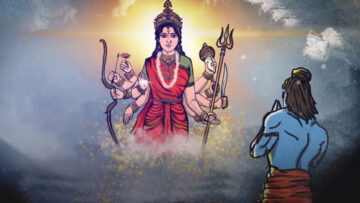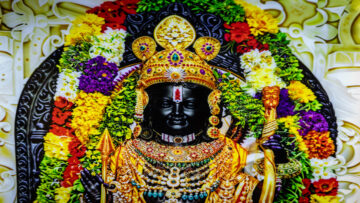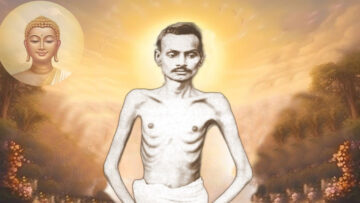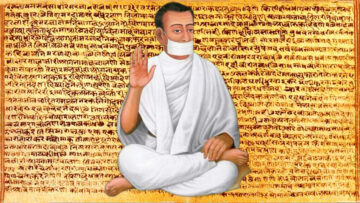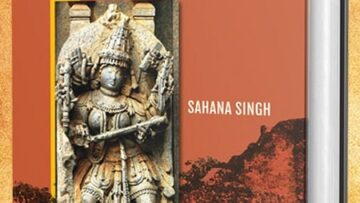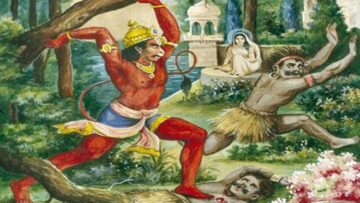Our Kurukshetra today is not one battlefield, but spans media, academia, social media, politics, courts, and the public spaces across many countries. The Kauravas today are a massive army attacking Hindu texts, temples and traditions. Our goal is dharma rakshana – more specifically, the survival of Hindu dharma. Hearteningly, a mini akshauhini of dharma yodhas are coming together voluntarily to fight this battle out of concern and love for dharma.
Yet, to be a dharma yodha today is not easy. For one, this battle will not be over in 18 days or even in 18 years. The dharma yodhas have neither the skill nor the courage of an Arjuna. Our Bhishmas and Dronas are as helpless as they were in the Kuru court. The enemy has more resources and power. Our army seems to lack vision and cohesion, but most of all, lacks the divine stewardship of Jagadguru Krishna.
Yet, we do have His Gitā – His words of wisdom and motivation – that are as applicable for us today for our dharma yuddha, as they were for Arjuna in that battlefield eons ago.
This essay focuses on what wisdom we can draw from the Bhagavad Gitā to fight the battle today in a way that protects dharma and, at the same time, progresses each of us in our pursuit of moksha. It draws out only ten very practical lessons for sādhakas fighting today’s war.
1. Swadharma- Fight as a duty
Fighting for dharma is not a favour we are bestowing on society. Krishna asks Arjuna to fight as his duty. We should consider fighting the dharma yuddha as our swadharma – in fact, it can be considered as a rishi yagna, as part of the panchamaha yagna. It is, after all, our way of expressing gratitude to our rishi parampara who have passed on this great culture to us.
swadharmamapichāvekṣhyanavikampitumarhasi 2.31
Considering your duty, you should not waver.
2. Shreyahswadharma – Act based on personality
The most impactful way to fight the yuddha is to contribute in ways that suit our personalities. One’s specific contribution may vary based on our gunas with roles ranging from leadership, legal activism, field work, intellectual work to financial contributions. It is important to determine what we are capable of, rather than trying to do what we are not proficient in. This will ensure we don’t face personal dissatisfaction and become useless for the cause. If one cannot meaningfully contribute, even a simple prayer for Bhagavan’s grace will do.
śhreyānswa-dharmoviguṇaḥ para-dharmātsv-anuṣhṭhitāt 18.47
It is better to do one’s own dharma, even though imperfectly, than to do another’s dharma, even though perfectly.
3. Karmasukauśalam – Work skillfully
While many want and claim to be dharma yodhas, this task comes with a responsibility. Like Arjuna, one has to do the required tapas to develop skills, execute efficiently and contribute to the cause effectively. There are many admirable yodhas who have performed their tapas to create impactful institutions, publish books or videos, win elections, fight court cases, etc. We can find areas to add power to the army. Krishna calls such skillful work itself as yoga.
yogāyayujyasvayogaḥkarmasukauśhalam 2.50
Strive for Yoga, which is the art of working skillfully
4. Samatvam – Maintain equanimity
An elderly lady who has been a tireless fighter for dharma once expressed her despondence after a temple loot episode, “I cannot bear to see such news. I lose sleep”. Running away from the war at the first sight of blood is not the sign of a warrior. Such a warrior who is devastated by each setback will be a liability for the army. Hence, Krishna mentions the need for samatvam at both wins and losses. Samatvam is not a meek acceptance but a deliberate sadhana to keep one’s mind calm so one can continue the fight.
sukha-duḥkhe same kṛtvālābhālābhaujayājayau
tatoyuddhāyayujyasvanaivampāpamavāpsyasi 2.38
Maintain equanimity when faced with happiness and distress, gain and loss, victory and defeat – fight, and in this way you will not incur impiety.
5. Dhṛtyutsāha – Be persistent and enthusiastic
A concerned Facebook friend once commented with frustration after an attack on Deepavali, “How long will this go on? How many years do we have to fight?”
Devi Mahatmyam mentions that the great MahaVishnu Himself fought for 5000 years with Madhu-Kaitabha. We know of the many immensely long battles fought by Durga, the Dashavataras, and the devas. More recently, our ancestors have been fighting continuously over the last millennium. Hence, we are not the only generation in history fighting for dharma. We cannot allow ourselves to feel frustrated and mentally tired. Krishna calls the one who works with perseverance and enthusiasm as the sāttvikakartā.
dhṛtyutsāhasamanvitaḥ 18.26
Endowed with persistence and enthusiasm
6. Titiksha – Develop fortitude to face hurdles
Dharma yodhas cannot give into mentally draining, unproductive laments about lack of support from fellow warriors, hurdles posed by courts or government, bans on social media, or difference of opinion within the group. Accepting these as inevitable will free us from such frustration and keep the focus on the long battle.
mātrā-sparśāstukaunteyaśītoṣṇa-sukha-duḥkhadāḥ
āgamāpāyino ‘nityāstāḿstitikṣasvabhārata 2.14
The alternating appearance and disappearance of happiness and distress, of heat and cold arise from sense perception, O Bharata. One must learn to tolerate them without being disturbed.
7. Vigatajvarah – Be cool when fighting
“Work with passion” is a modern refrain. Yet, extreme passion can be a fever – jvarah. We see such passionate dharma yodhas become very heated in mind, words, and actions, which is neither good for them nor their cause. Such passions in social media often lead to unnecessary fights and fracture within the group. When one avoids such fevers of the mind, one can deal with differences in a calmer, more productive manner.
yudhyasvavigata-jvaraḥ 3.30
Fight without feverish passion
8. Nirmama – Leave behind ego
The above jvara – the passion – happens because we needlessly invest our egos into the yuddha. Our kartrtvam, doership, is so strong that we get too attached to our ideas, our opinions, our roles, and our capabilities at the expense of our goal. While we should bring our abilities and efforts to the battle, we should leave behind our doership. This attitude is more beneficial for the cause, while also keeping our minds pure and calm.
nirmamobhūtvāyudhyasva 3.30
Fight free from ego/doership
9. Nirvairi – Fight without hate
Dharma yodhas who are also sadhakas face a dilemma. Sadhakas try to develop daivisampat – the divine qualities – which include ahimsa, akrodha, adroha, and kshanti – non-violence, non-anger, non-hate and forgiveness. How do we manage this requirement in a battle? Krishna Himself gives us the solution. He advises us to do our duty, without any hatred or malice towards the enemy. One way for dharma yodhas to do this is to separate the beliefs and ideologies of our enemy from the person. Our enmity is only towards anti-dharmika ideologies and attacks, and not with the persons fighting for that ideology. We can, in fact, pray for the enemies to develop divine qualities.
nirvairaḥsarva-bhūteṣhuyaḥsamāmetipāṇḍava 11.55
(Those) without malice toward all beings, such devotees certainly come to me.
10. Nimittamātram – Be an instrument of the Lord
All of the above are excellent ways to contribute effectively to the dharmakshetra while maintaining one’s own mental serenity and purity. However, it is not easy when one is deeply involved in the cause, and is fighting every day, balancing it with one’s own personal and professional lives. How does one achieve all these values? Krishna suggests we do this by just being His instrument.
After all, the Lord who Himself is dharmakarta and dharma adhyaksha, is also the One who is dharmapāla. We are all just His instruments. With this IshwaraArpana buddhi, it is far better to see ourselves as foot soldiers in an eternal battle led by our devatas and guided by our rishis than to be a lone wolf.
nimitta-mātraṁ bhava 11.33
Be an instrument of my work
In summary, if we become skilled, brave, selfless, humble, persistent, and enthusiastic Arjunas, and if we keep Krishna by our side in the form of His Gitā itself, we will certainly achieve wellness, victory, prosperity, and righteousness, all leading to dharma.
yatra yogeśhvaraḥkṛiṣhṇo yatra pārthodhanur-dharaḥ
tatraśhrīrvijayobhūtirdhruvānītirmatir mama 18.78
Wherever there is Yogeśvara Krishna, and wherever there is Arjuna, there will be unending wellness, victory, prosperity, and righteousness. Of this, I am certain.
It is with this Karma yoga attitude that not only can we fight and win the good war, but also improve on our adhikara towards moksha.
Jai Bhagavad Gite!
(Editor’s Note: Srimad Bhagavad Gita, the nectar of knowledge for mankind, spanning over 18 Parvas and 700 verses which are conversations between Bhagawan Srikrishna and Arjuna at the beginning of the Kurukshetra war, is an ultimate repository of spiritual wisdom. On the occasion of Gita Jayanti, we celebrate this ‘Divine Song of Bhagawan’ as even today it continues to inspire us and guide us with its relevance. With this, we are publishing the best articles that we received as part of our Gita Jayanti Competition.)
Image credit: picxy.com
Disclaimer: The opinions expressed in this article belong to the author. Indic Today is neither responsible nor liable for the accuracy, completeness, suitability, or validity of any information in the article.




